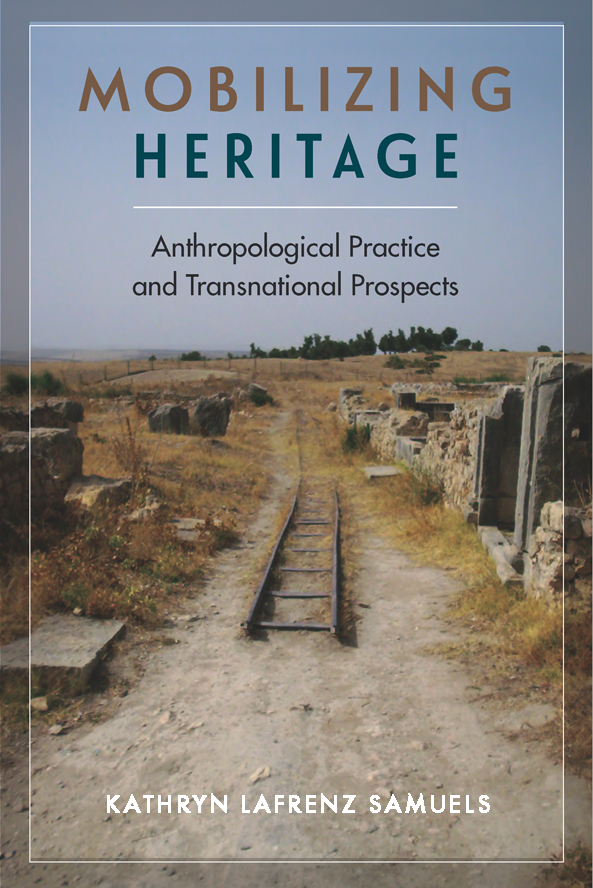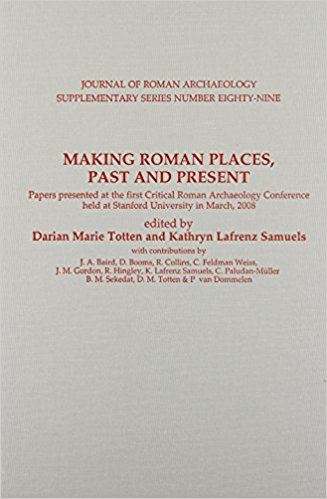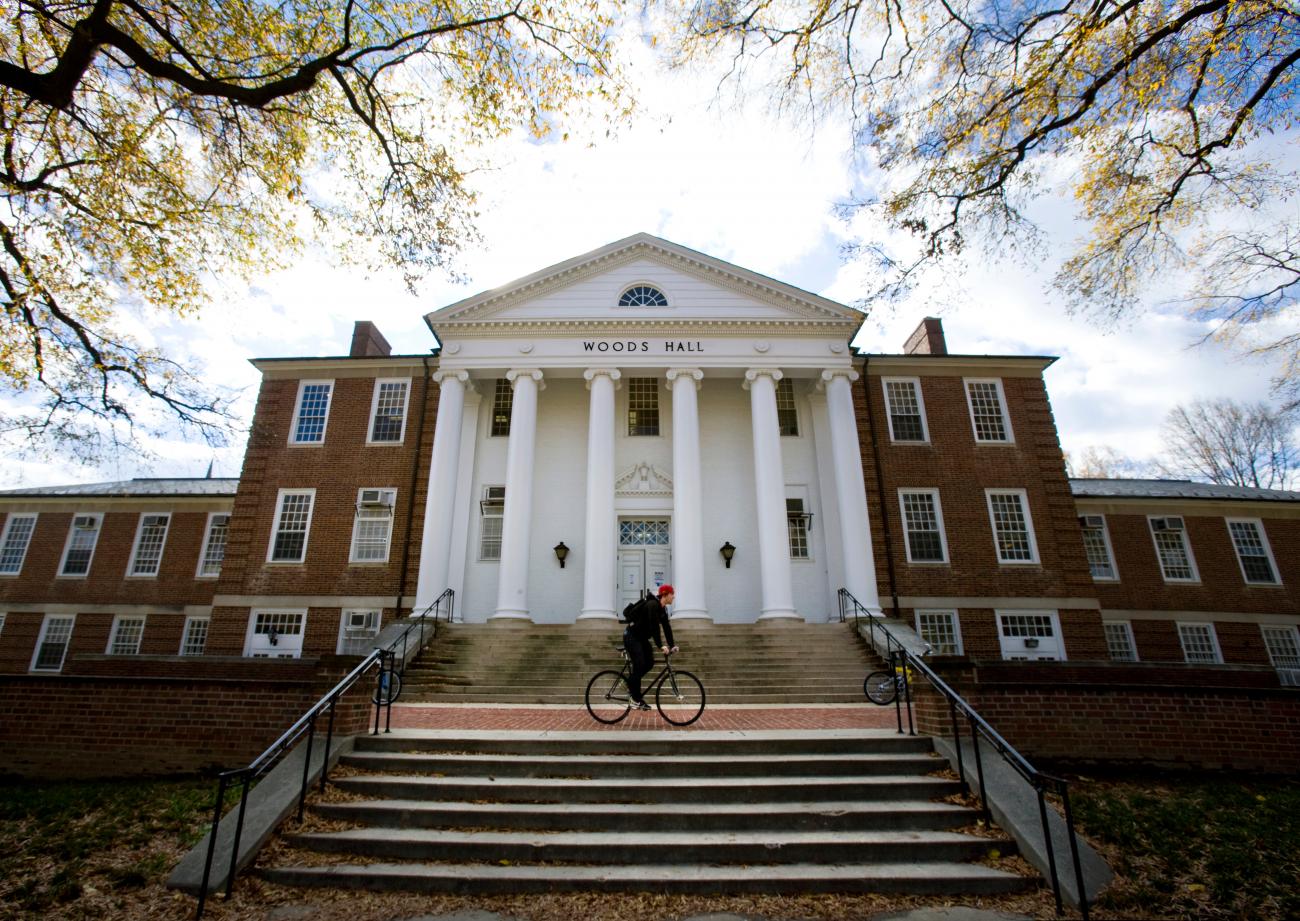Kathryn Lafrenz Samuels is Associate Professor and Director of the Cultural and Heritage Resource Management graduate program in the Department of Anthropology. She also serves as Editor for the journal Conservation and Management of Archaeological Sites. She received her PhD in Anthropology from Stanford University, building on a master's degree in Public Archaeology from the University of South Florida, and a bachelor's degree in Classical and Near Eastern Archaeology from Bryn Mawr College. Her work integrates archaeology and sociocultural anthropology around issues of cultural heritage, focusing especially on the transnational contexts of heritage, including international development, human rights, democracy building, and global climate change. Her current research projects center on the nexus between cultural heritage and climate change, including biodiversity loss as well as the persuasive capacity of heritage to mobilize change in democratic societies. Dr. Lafrenz Samuels’ work has been supported by the American Council of Learned Societies, the American Institute of Maghrib Studies, the US-Norway Fulbright Foundation, and the National Science Foundation.
Current research projects include:
Anthropogenic: The Cultural Heritage of Climate Change examines the heritage of human-caused climate change, through the historic resources and material infrastructure of carbon-based energy exploration, extraction, and exploitation in the United States and Europe. Rather than being simply or only a history of humankind’s contributions to climate change, this project connects the historical development of anthropogenic climate change with responses to climate change in the present, and how the past becomes mobilized within current debates on "what to do." A heritage-centered account of the contingent trajectories of anthropogenic climate change is much needed, not simply to underline that indeed climate change is caused by humans, but to make plain that climate change has been authored by specific societies, classes, and industries at the expense of others. The differential responsibilities and vulnerabilities involved--for example, the fundamental 'paradox' that those societies historically most responsible for climate change will be the least impacted, whereas those historically least responsible will be the most impacted--require an approach that connects past and present and privileges both within the same analytical frame, telling these histories and narratives in textural detail. Further, this project advances cultural heritage as an incisive analytical lens for grappling with climate change, given the instrumental character of heritage as a social tool for managing change.
Heritage Landscapes and Agrobiodiversity under Climate Change integrates methods of landscape archaeology and heritage ethnography to investigate the impacts of climate change on traditional agricultural practices and heritage landscapes in several vinicultural landscapes in Italy. Viniculture is at the frontline in witnessing the impacts of climate change to agricultural production, being especially vulnerable to climate change given the particular sensitivity of wine grapes to climate fluctuations. The wine industry in Europe is predicted to be hit particularly hard compared to other wine regions in the world. The suitability of cultivation for present grape varietals is expected to shift to higher latitudes and altitudes, a change that strikes a blow to the heart of the concept of terroir, a concept developed specifically to characterize the European wine-making tradition. The project focuses on the implications of climate change for agrobiodiversity; adaptive management responses for safeguarding agricultural heritage resources; and opportunities for climate communication through Globally Important Agricultural Heritage Systems (GIAHS) and UNESCO World Heritage cultural landscapes.
Climate Footprints of Heritage Tourism develops a climate communication recognition scheme (CCRS) for UNESCO World Heritage Sites, to explore the communicative power of heritage to mobilize stakeholders around climate mitigation and adaptation. Such a scheme might influence site management and tourist decision-making for increased sustainability in the context of global climate change by increasing climate awareness among visitors and bringing the global crisis of climate change to a personal scale. The project assesses four dimensions for the CCRS: carbon footprint data, narrative potential, sustainability practices, and the impacts of climate change on heritage resources. This project builds on the "branding" value of World Heritage in its development of a CCRS, set against the backdrop of increasing tourism, including the doubling of international air travel in the next 15-20 years, and the implications of this growth for climate change. The CCRS has been developed into an ArcGIS StoryMap featuring 50 World Heritage Sites: https://heritageofclimate.com.




Selected Publications:
Books
In prep. Anthropogenic: The Cultural Heritage of Climate Change.
2023. (with J.D. Daehnke) Heritage and Democracy: Crisis, Critique, and Collaboration. Gainesville: University Press of Florida. Link
2018. Mobilizing Heritage: Anthropological Practice and Transnational Prospects. Gainesville: University Press of Florida. Link
2015. (with T. Rico) Heritage Keywords: Rhetoric and Redescription in Cultural Heritage. Boulder: University Press of Colorado. Link (review) (review) (review)
2012. (with D. Totten) Making Roman Places: Past and Present. Journal of Roman Archaeology Supplement Series 89. Portsmouth, RI: JRA. Link (review)
Technical Reports
2016. (with A. Markham, E. Osipova, and A. Caldas) World Heritage and Tourism in a Changing Climate. Nairobi/Paris: UNEP & UNESCO. Link
Journal Issues Edited
2017. (with T. Rico) Biodiversity and Cultural Heritage Under Global Climate Change. Culture, Agriculture, Food and Environment (CAFE) vol. 39(2). Link
2007. (with S. De Vivo and D. Totten) Cultures of Contact: Archaeology, Ethics, and Globalization. Stanford Journal of Archaeology vol. 5. Link
Articles and Chapters
2023. (with J.D. Daehnke) "Heritage and Democracy: Crisis, Critique, and Collaboration." In Heritage and Democracy: Crisis, Critique, and Collaboration, K. Lafrenz Samuels and J.D. Daehnke, editors, pp. 7–31. Gainesville: University Press of Florida.
2023. (with B. Foster Bhusari) "Public Reason after Charlottesville: Heritage, Memes, and the Far Right." In Heritage and Democracy: Crisis, Critique, and Collaboration, K. Lafrenz Samuels and J.D. Daehnke, editors, pp. 174–191. Gainesville: University Press of Florida.
2023. (with J.D. Daehnke) "Heritage and the Incompleteness of Democracy: Challenges and Opportunities." In Heritage and Democracy: Crisis, Critique, and Collaboration, K. Lafrenz Samuels and J.D. Daehnke, editors, pp. 251–263. Gainesville: University Press of Florida.
2023. (with E.J. Platts and H.L. Keifer) Carbon Footprints of Travel to World Heritage Sites: Communicating Climate to Potential Tourists through a Consumption-based Life-cycle Assessment. Journal of Heritage Tourism. DOI: 10.1080/1743873X.2023.2171297
2022. (with E.J. Platts) Global Climate Change and UNESCO World Heritage. International Journal of Cultural Property 29(4): 409-432. Link
2020. (with E.J. Platts) An Ecolabel for the World Heritage Brand? Developing a Climate Communication Recognition Scheme for Heritage Sites. Climate 8(3), 38 (1–16). Link
2019. "Heritage Development: Culture and Heritage at the World Bank," in The Cultural Turn in International Aid: Impacts and Challenges for Heritage and the Creative Industries, S. Labadi, editor, pp. 55–72. Abingdon/New York: Routledge. Link
2019. (with P. van Dommelen) "Punic Heritage in Tunisia," in Oxford Handbook of the Phoenician and Punic Mediterranean, C. López-Ruiz and B. Doak, editors, pp. 729–742. New York: Oxford University Press. Link
2019. Commentary – From Determinism to Accountability: Archaeology, Anthropology, and Ethics. Archaeological Dialogues 26(1): 14–17. Link
2019. Deliberate Heritage: Difference and Disagreement After Charlottesville. The Public Historian 41(1): 121–132. Link
2017. New Challenges for Cultural Heritage: Supporting Biodiversity in the Face of Climate Change [Introduction to Special Issue "Cultural Heritage, Biodiversity, and Climate Change"]. Culture, Agriculture, Food and Environment (CAFE) 39(2): 69–71. Link
2017. Biodiversity in World Heritage Cultural Landscapes: Possibilities and Problems for Communicating Climate Change and Mobilizing Mitigation. Culture, Agriculture, Food and Environment (CAFE) 39(2): 116–126. Link
2017. Commentary – Climate Archaeology: New Paradigms for Changing Times. Archaeological Review from Cambridge 32(2): 222–228. Link
2016. (with M. Ferrer Martin) "Women's Ritual Practice in the Western Phoenician and Punic World," in Women in Antiquity: Real Women Across the Ancient World, S. Budin and J. Turfa, editors, pp. 533–552. London: Routledge.
2016. Transnational Turns for Archaeological Heritage: From Conservation to Development, Governments to Governance. Journal of Field Archaeology 41(3): 355–367. Link
2016. The Cadence of Climate: Heritage Proxies and Social Change. Journal of Social Archaeology 16(2): 142–163. Link
2015. "Introduction: Heritage as Persuasion," in Heritage Keywords: Rhetoric and Redescription in Cultural Heritage, K. Lafrenz Samuels and T. Rico, editors, pp. 3–28. Boulder: University Press of Colorado. Link
2015. "Heritage Rights and the Rhetoric of Reality in Pre-Revolution Tunisia," in Heritage Keywords: Rhetoric and Redescription in Cultural Heritage, K. Lafrenz Samuels and T. Rico, editors, pp. 243–258. Boulder: University Press of Colorado. Link
2015. (with I. Lilley) "Transnationalism and Heritage Development," in Global Heritage: A Reader, L. Meskell, editor, pp. 217–239. Malden, MA: Wiley. Link
2012. (with D. Totten) "Roman Place-Making: Archaeological Interpretation and Contemporary Heritage Contexts," in Making Roman Places, D. Totten and K. Lafrenz Samuels, editors, pp. 11–33. Portsmouth, RI: JRA.
2012. "Roman Archaeology and the Making of Heritage Citizens in Tunisia," in Making Roman Places, D. Totten and K. Lafrenz Samuels, editors, pp. 159–170. Portsmouth, RI: JRA. Link
2010. "Heritage Management and Poverty Reduction," in Heritage and Globalisation, S. Labadi and C. Long, editors, pp. 200–215. London/New York: Routledge. Link
2009. Trajectories of Development: International Heritage Management of Archaeology in the Middle East and North Africa. Archaeologies: The Journal of the World Archaeological Congress 5(1): 68–91. Link
2008. Value and Significance in Archaeology. Archaeological Dialogues 18(1): 71–97. Link
Other Work
2011. Field Work: Constructing Archaeological and Ethnographic Intersections [book review]. Cambridge Archaeological Journal 21(1): 152–156. Link
2007. (with S. De Vivo and D. Totten) Proceedings of 'Cultures of Contact: Archaeology, Ethics, and Globalization.' Stanford Journal of Archaeology vol. 5. Link
Areas of Interest
- Cultural heritage, climate change, biodiversity, archaeological ethnography & heritage ethnography, international heritage management, rights & democratic practice
| Course Name | Course Title | Semester | Syllabus |
|---|---|---|---|
| ANTH360 | Method and Theory in Sociocultural Anthropology | Spring 2025 |
Current Students
Former Students
-
Amber Cohen
-
Allison Stacy
-
Jamie Colopietro
-
Sierra DeVanie
-
William Glass
-
Chris Goodrich
-
Abigail McCoy
-
Peter Sittig
Related Students (Listed by Student on Student's Profile)
-
Kenneth Aasand
-
Allison Anderson
-
Christopher Anderson
-
Zachary Andrews
-
Emily Bales
-
Duncan Balinger
-
Meagan Bell
-
Tamara Billie
-
Weston Bittner
-
Katie Boyle
-
Jacob Carlson
-
James Chatham
-
Thomas Christian
-
Kayla Cochran
-
Emma Collett
-
Jamie Colopietro
-
Jillian Conroy
-
Cullan Davis
-
Sierra DeVanie
-
Nina Diaz
-
Julia Drozdowski
-
Kevin Etherton
-
Grace Evans
-
Wendy Ferris-George
-
Joshua Finken
-
Matthew Fisher
-
Timothy Frank
-
Kurt Fredrickson
-
Kenneth Gergely
-
William (Jon) Glass
-
Chris Goodrich
-
Olivia Goodwin
-
Zoe Goodwin
-
Suzan Granados
-
Jordan Haddad
-
Christopher Haisley
-
Cynthia Hamilton
-
Tori Hammerschmidt
-
Lori Hansen
-
Darrell Hardy
-
Samuel Hauber
-
Emily Haus
-
Janice (Livi) Heebsh
-
Delaina Hunter
-
Elijah Huszagh
-
Tristan Huxtable
-
Laurence Jackson
-
Jeffrey Johnson
-
Robert Johnson-Ramirez
-
Alexander Kerr
-
William (Max) Kichline
-
Ansley Lester
-
Leeanne Mahoney
-
Nicole Martin
-
Abigail McCoy
-
Bruce McRoberts
-
Matthew Morris
-
Isla Nelson
-
Isabelle Ortt
-
Paolo Panunzio
-
Emily Pelster
-
Ellen Platts
-
Samuel Plent
-
Wendy Puckett
-
Jose Ramirez
-
Fernando Ramirez-Cotto
-
Madison Ramsey
-
Dean Reed
-
Samantha Renta
-
Alessa Rulli
-
Jacob Ruvalcaba
-
Peter Schnurr
-
Nathan Scully
-
Peter Sittig
-
Emily Smithey
-
Allison Stacy
-
Noor Sullivan
-
Eric Taylor
-
Noelle Thompson-Worthington
-
Katherine Titus
-
Scott Tooker
-
Jewel Touchin
-
Jessica Ulmer
-
Nicole Ursin
-
Maximilian van Rensselaer
-
Douglas VonStrohe
-
Riveraine Walters
-
Mason Waugh
-
Hilary Wehrle
-
Chelsea Winter
-
Emma Woodruff


